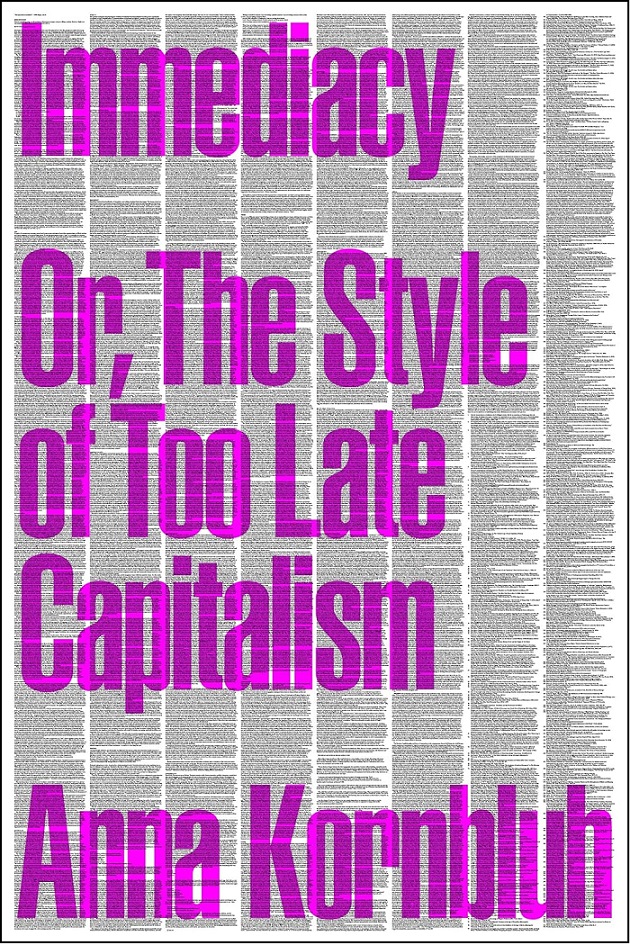Immersing the mind of a viewer in a virtual reality can be witnessed in the zombie-like deportment of people of all ages glued to phone or tablet screens, part of a craving for immediacy that is now seemingly embedded in Western culture.
 Sean Sheehan
Sean Sheehan
It is an aspect of the subject matter of Anna Kornbluh’s “Immediacy”, looking at how twenty-first century gig-labour models of capitalism, such as Uber, and on-demand consumerism, like same day shipping and one-click consumerism, enhance profit-making by pursuing fluidity, connectivity and directness. How this development is effecting a new aesthetic, one that feels no need for mediation, is the worrying concern of Kornbluh’s book.
Mediation, “making sense and making meaning by inlaying into medium”, is necessary because what is immediately present needs interpreting and placing within a horizon of meaning. The importance of this is being decommissioned with shows of immediacy that promise self-identity; ‘eating the real with a spoon’ as Kornbluh puts it.
 Immediacy in the economy, fuelled by digital technology, is replicating itself in our minds as we become acclimatized to browsing and skimming (summarized by Kornbluh as “seeing is reading”).
Immediacy in the economy, fuelled by digital technology, is replicating itself in our minds as we become acclimatized to browsing and skimming (summarized by Kornbluh as “seeing is reading”).
The viewing of pages and clicking of links gives the giant companies that handle so much of our online communication too much information about our lives and drowns us in images that feed narcissism. Kornbluh finds an aesthetic mirror image of this in authors who reject mediation in their writing and she highlights Knausgaard’s autofiction for its immiserating itemising of one thing after another and the writer Rachel Cusk who finds narrative fiction passé.
“Immediacy” is true to itself by not being a book that can be read quickly. Her material is wide-ranging and there is a rich and sometimes dense fluency to her writing that demands patient re-reading. Here she is summarising a kind of writing popularised by Paul Preciado’s “Testo Junkie” (‘una autoteoria’ in Spanish):
Autotheory’s flexible modalities and limitless mobilities disperse it widely. In these lucrative and revered works, academics proffer lyrical expressions of personal experience and impressionistic musing punctuated by theory quips… Fullnesses of charismatic persona, corporeal receptivity, and affective flooding devise an evanescent plenum that pre-empts criticism… Immediacy in theory is this argumentless intensity immured from dissent and devoid of high-order integration. It goes down smooth.
 The selfie, not surprisingly, is targeted as a signature for this new aesthetic and Kim Kardashian’s “Selfish” is seen as exemplary for its canny pseudo-irony and deployment of #No Makeup #NoFilter images to convince the viewer of an unmediated truth. In her concluding chapter, Kornbluh looks to writers of fiction for antidotes to immediacy, authors like Colson Whitehead, Brandon Taylor and Diana Evans, and cultural theorists like Caroline Levine and Sianne Ngai.
The selfie, not surprisingly, is targeted as a signature for this new aesthetic and Kim Kardashian’s “Selfish” is seen as exemplary for its canny pseudo-irony and deployment of #No Makeup #NoFilter images to convince the viewer of an unmediated truth. In her concluding chapter, Kornbluh looks to writers of fiction for antidotes to immediacy, authors like Colson Whitehead, Brandon Taylor and Diana Evans, and cultural theorists like Caroline Levine and Sianne Ngai.
They offer resistance to cultural forms that encourage passive consumption instead of critical thinking. It is time, she makes clear, to get off the hamster wheel that is keeping us enthralled with glossy forms of immediacy and instant gratification.
“Immediacy or, The Style of Too Late Capitalism”, by Anna Kornbluh, is published by Verso.












.jpg)












